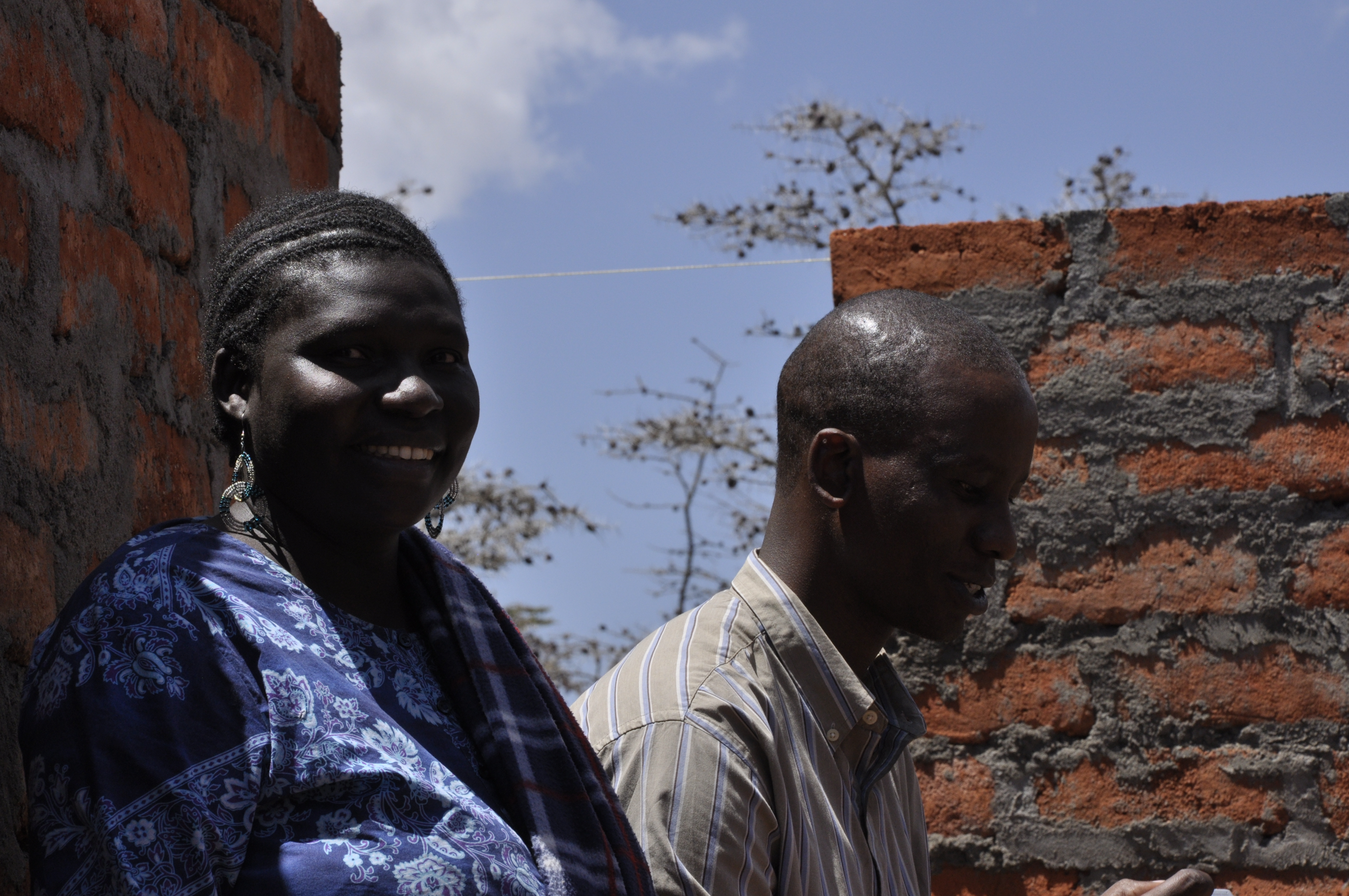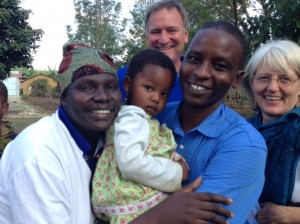Outgive them? Not possible.
Posted by admin | Filed under Featured, News

How can I help you know Rose and Wilson Lengima? I would love for you to meet them. The best we can do is invite you to imagine one of our visits to their Arusha home while in Tanzania last fall. Take a seat in our borrowed dusty jeep and drive with us to their house.
From the quiet streets of the walled and gated home where we’re staying, we drive along the congested main city drag, and eventually turn onto a busy, dirt side street. There we bump haltingly along swerving around pot holes, crawling along beside kids in school uniforms laughing and teasing their way home, and stopping abruptly to make way for a man pushing a wheelbarrow containing a cow head. (yes, a cow head. No, I don’t know why but I wouldn’t be surprised if some or all of it ends up on a plate). On either side are tiny, tired looking kiosks – stationary store, barber, tailor, a produce vender with tomatoes piled in a bright pyramid – all color and dirt and Swahili with the volume turned up. We make our way through another turn, to a fork that stymies us, ask the locals for the Lengima house- no one seems to know the name. After a short siesta in the car, Wilson arrives in response to our text to lead us the rest of the way to their Arusha house. He tells us the locals surely could have directed us if we’d asked the way to “the teachers” house. Or “the Maasai” house.
Wilson takes this same route regularly to and from his office space donated by Angelika’s organization. There he conducts Maasai School project related business such as meeting with with Angelika’s staff to discuss the best options for rainwater harvesting systems; or to pick up paperwork before heading out to the building site where he can make sure all the recently purchased materials arrive in good order; or to email photos of receipts to Tim and discuss with him the next step.
Their home is removed from the lane of the traveling cow head and stands behind a row of trees in a quiet spot with a bit of elbow room to it. It’s a good house. Made of good solid concrete block and metal roof with not one but three outhouses along one side. Outhouses are a clear step up from the bush where women relieve themselves in the morning among the cows in the enclosure before milking and releasing them to be grazed. The privacy (and safety) of a nearby outhouse is a very good thing.
Dear gracious, smiling Rose accompanies us into their home. She wears a brightly patterned modern African house dress rather than the business suits from her days as a headmistress. She’s home these days caring for their newborn son, Micah, and daughter, Itiya. At the cement front step we’re greeted by Wilson’s mother Niyo who wears a wide happy smile with hands outstretched to shake ours. I hug her thin shoulders and she returns the joy at seeing each other once again. She’s dressed in colorful traditional garb and beaded jewelry and takes her place on one of the three fabric love seats wedged into the livingroom around a coffee table. In Africa to visit someone is to give the gift of your presence. I like that.
Rose passes through the curtained doorway and then back with cold sodas from a tiny fridge in the dim hallway. She then disappears into the crude kitchen the size of a long walk- in closet. If you lend a hand preparing lunch, you might slice cucumbers and tomatoes, or stir the meat sauce on the propane burner or check the rice to see if it’s done. You might give an encouraging word to Rose who, though experienced as headmistress, is a bit tentative about cooking for guests. She won’t eat the food she’s cooking – for the first three months after bearing a baby Maasai women traditionally drink only milk. And we won’t eat all that is being prepared because we know the leftovers will be shared with the four school aged nieces and nephews staying with Rose and Wilson while they attend an Arusha school.
Wilson and the men wait outside in the dirt yard sitting on overturned buckets, talking, laughing together. Wilson, as always, is calmly cheerful and welcoming. He treats us with the same respect that he offers to his older brothers in the bush, to his wife Rose, and to the government officials he sometimes deals with. His good humor, quick intelligence, and trustworthiness are characteristics that make him a stand out individual.
For all of us, the treasures in this simple one bedroom are the children. Rose, who was determined she would never marry (traditional Maasai marriage is not typically a walk in the park), was won over by Wilson and they now happily raise their two children, Itiya (girl, age 3) and Micha (boy, 2 months at our November visit). Itya is shy at first, standing with dimpled hand on her grandmother’s knee gazing silently at us with deep brown eyes. As time goes on she loosens up and we are treated with fetching smiles and the precocious play of a three year old. You are given the gift of holding Micha wrapped in deep folds of yellow blanket head sporting a tiny knit hat. He gazes into your eyes and you see in them the simplicity of a new born wrapped in the history of an ancient people migrating over the ages from the Nile region. The children are gorgeous and well loved and throughout our shared meal and conversation and eventual business meeting they are a delightful part of our time together. When it’s time to leave, we all leave feeling blessed.
So now I ask you, if it were your children where would you want to raise them? In a country of widespread poverty, unemployment, disease, and illiteracy? Wouldn’t you want to take a well paying job and put your kids in an Arusha school and raise them knowing how to get around in the modern world? Visits to the bush to stay in touch with ones roots would be treasured, but the draw to stay in Arusha would be strong.
Arusha is where people can take advantage of what the 21st century offers. Running water. Electricity. Sanitation. Hospitals. Educated folks (meaning at least elementary school and some graduating high school) who understand things such as germs and who have some understanding of the world outside their doorsteps. Choices in food and clothing, cold sodas, things to do and places to worship and… And that’s just the beginning, Right?
Wilson and Rose were both born in the bush and they were so passionate about changing their lives for the better that they ran away from their homes in the bush to go to school (Rose as a child and Wilson as a teenager). Rose and Wilson are now university educated, are talented and of excellent character. It’s important for you to know that in the past year they’ve both had excellent job offers come their way. They have turned them down – and not without inner struggle – for the sake of establishing the secondary school in the bush. The school you and we are partnering with them to establish.
These two, who have the chance at good jobs in the security of the city, are choosing to return with their children to the bush.
Let’s just camp there for a second.
Right.
Humbling.
Though we can give much to this project, I don’t believe we can outgive Rose and Wilson.
Thanks for coming along for a visit.
